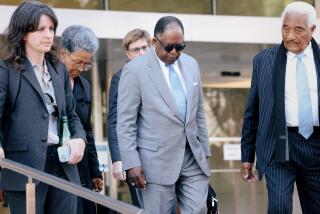Conflict Among Denny Jurors Indicated
- Share via
A question from the jury in the Reginald O. Denny beating trial indicates that a conflict has arisen between at least two members of the panel.
The question sent to Superior Court Judge John W. Ouderkirk in two different versions Friday suggests that one juror has accused another of not deliberating.
The panel wanted to know if a juror can be accused of not deliberating after he or she has reached a decision based on jury instructions and stated a reason for that decision “numerous times.”
Jurors asked: “Does one juror have the right to demand that another juror (list) evidence and reasons step by step, word for word challenging (an) opinion or decision?” Failure to meet that demand, the question suggested, has resulted in one juror accusing another of not deliberating.
In a second version of the question, written in a different handwriting, the panel asked: “When a juror (asks) another juror to list the evidence and reasons that determined their decision, does that juror have the obligation to answer the juror as a responsibility of deliberations?”
Ouderkirk was attending a relative’s funeral Friday and was expected to answer the question this morning.
The jury is weighing the fate of Damian Monroe Williams, 20, and Henry Keith Watson, 29, charged with premeditated attempted murder in the beating of Denny at Florence and Normandie avenues.
Williams also is accused of aggravated mayhem--intentionally causing permanent disability or disfigurement--for allegedly hitting Denny in the head with a brick. Premeditated attempted murder and aggravated mayhem carry maximum penalties of life in prison.
The two men also are charged with assaulting or robbing seven other people at the intersection as rioting broke out in the wake of not guilty verdicts in the first Rodney G. King beating trial in Simi Valley.
On Friday, jurors also asked another question on a jury instruction relating to charges of assault and assault with a deadly weapon.
“Does ‘or’ mean ‘and’; does ‘likely’ mean ‘it did occur’; and should we take into consideration ‘intent’ even though it does not appear in (a) particular element (of a charge)?” jurors asked.
Ouderkirk answered the question Friday morning before leaving for the funeral, saying “OR means OR, it does not mean AND. ‘Likely’ does not mean that it did occur. Likely means likely.”
The judge told the panel to read the entire instruction and the definition of intent it contains.
The instruction says, in part, that to prove assault, prosecutors must prove that a person “intended to commit an act, the direct natural and probable consequences of which, if successfully completed, would be the application of physical force upon the person of another.”
Jurors are scheduled to deliberate today, take Sunday off and resume Monday. If a verdict is reached today, it will be announced Monday, court officials said.
More to Read
Sign up for Essential California
The most important California stories and recommendations in your inbox every morning.
You may occasionally receive promotional content from the Los Angeles Times.










